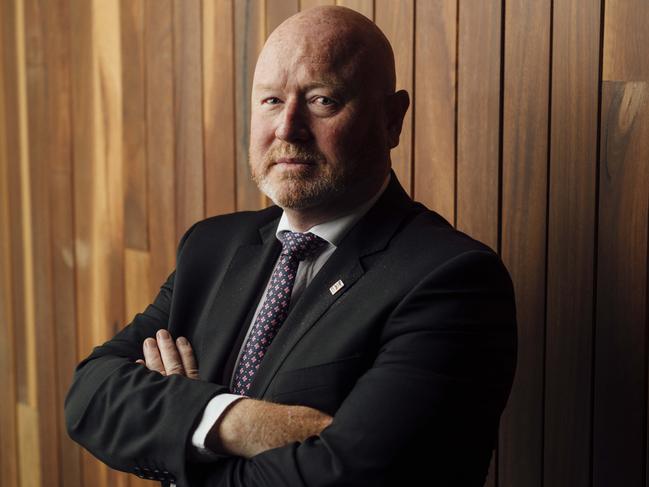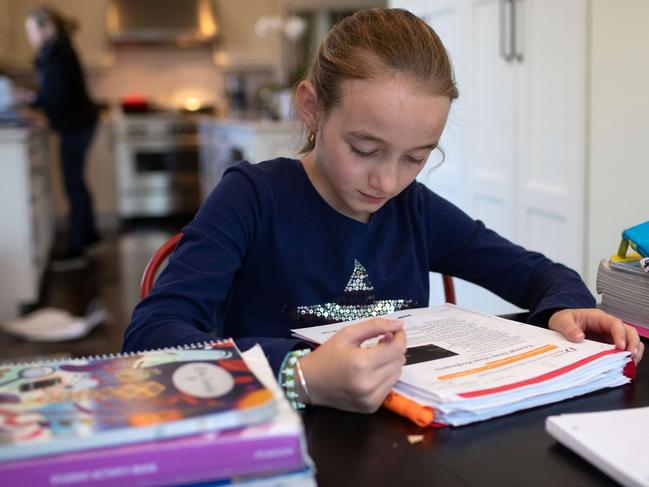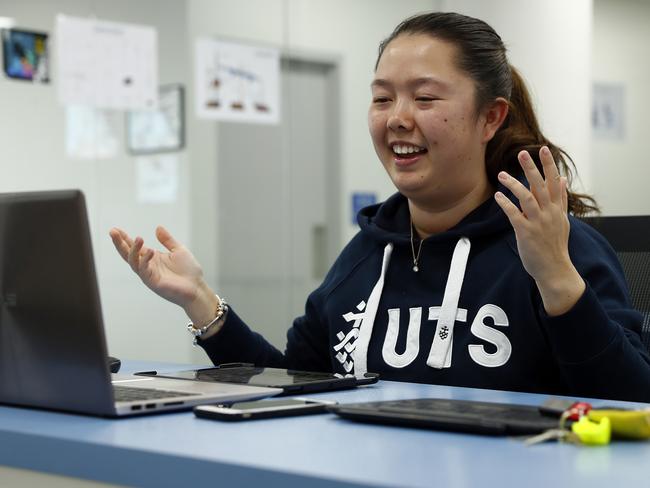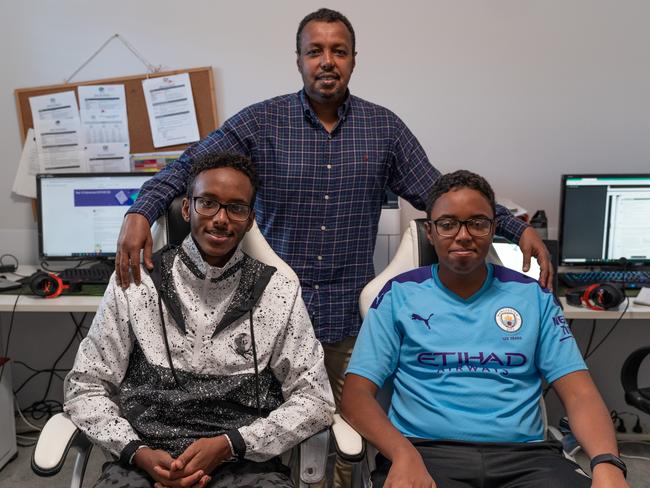Top tips for parents in keeping kids calm and focused while being schooled at home
Experts are calling for public TV and radio to be explored as a way to help students learn while studying at home. Here are the best tips to keeping your kids calm and focused if isolating.
Education
Don't miss out on the headlines from Education. Followed categories will be added to My News.
- PM’s new indoor gathering limit as Budget delayed
- Joyce: Rescue missions for stranded Aussies possible
Public television should be explored as a way to breach the digital divide and help students to learn remotely, according to a leading Australian educator who says ‘TV teaching’ should be considered if our schools close nationwide.
President of the Australian Primary Principals Association Malcolm Elliott said many schools were not prepared for online learning and while older students might adapt quickly, younger students would find it harder.
Mr Elliott is already talking with established education TV providers and will approach Governments.

“You don’t have to run a classroom lesson. It could be 20 minutes with a topic from the curriculum. Take Australian history and the arrivals of the Europeans in 1770 and the First Fleet in 1788,” he said.
“You have the teacher giving a very brief explanation … introducing some elements they can use as a focus for inquiry. For example the immediate impact on first Australians … and then cross to a first nation teacher to give a perspective. Then cite some places students can access via the internet for research and further connection.”
Mr Elliott said some families and schools would be able to easily access devices and might hire tutors while others would struggle to pay for resources.

“Which means kids from low socio-economic groups could miss out on crucial learning,” he said.
In contrast to hi-tech platforms which facilitate learning, virtually everybody has access to television and radio.
“It may be this could be a trigger to move away from exam based learning to a more continuous form of assessment … like developing a folio of work,” he said.
A teacher at a public high school, who asked to remain anonymous, said private schools were better resourced for online learning.
She said some schools had started this week, teaching public school teachers how to use online resources, but at the same time they were being told they would not be closing.

“There are a lot of mixed messages. They say it is business as usual but that we also need to prepare to go online,” she said.
She added teacher workloads had also increased as they were expected to continue in class teaching as well as providing work for the students who were remaining home.
“This is going to make the divide between wealthy and public schools even worse,” the teacher said.
Executive Director Sydney Catholic Schools Tony Farley said “the way we have approached and delivered education has changed forever.”
“The traditional approach to teaching and learning has moved on, and many schools are delivering content and learning remotely and online,” he said.
“No resource or technology under the sun can replace the genius and necessity of great teachers engaging with students to find their way into a life of endless learning.
“That’s one of the key reasons why there is such agitation about the possibility that schools could shut to stop the spread of COVID-19.”
MORE NEWS
Joyce: Rescue missions for stranded Aussies possible
Five of the best ways to work from home
Aussies join world in random acts of coronavirus kindness
Alpha Omega Senior College in Sydney voluntarily closed its doors this week and shifted to online learning.
Deputy principal Wesam Krayem said they had older teachers they wanted to protect as well as students with disabilities and compromised immune systems.
“We are in a position of responsibility and sometimes you have to make hard decisions,” he said.
Year 12 student Keenaan Jama said he had initially been concerned but it was all running smoothly.
“This is a big year but it’s going well. Sometimes we have even more access to our teachers and it is easy to concentrate because the teacher is on screen,” he said.
Edtech Verso Chief Operating Officer Tom Davies, who works with schools internationally as well as in Australia in establishing online classrooms, said Australian educators had generally been slow to adopt online learning but the COVID-19 crisis could force a transformation.

“Comparing this month to the last month we have had a 500 per cent increase and that is accelerating. Even in just the last two days we have seen a 2000 per cent increase,” he said.
Chief Learning Officer at Cluey Learning, Dr Selina Samuels, said her biggest concern was maintaining learning momentum for students.
“Many schools are already flagging the challenges represented by serving the needs of their students remotely,” she said.
“There is the more obvious issue of access to the appropriate technology and then comes the necessary skillet to deploy it effectively. Plus adapting what works in the classroom to an online environment isn’t always easy.
“These point to a potential issue of learning inequity that has not been fully anticipated or provided for.”
From Monday, kidsnews.com.au will provide free education tasks and fun activities for children in Prep to Year 9.
TOP TIPS FOR PARENTS WITH KIDS AT HOME
DO NOT PANIC
Our children, including teenagers, need to see we are not panicked; we ae coping well and resiliently with the information being presented.
Do be critical of the information you and your child and teenager are accessing.
Do not leave the TV news on, even if in the background.
It is important you control the narrative and have open non-catastrophic conversations – giving just enough information to reassure your child but not too much.
You can help guide your child and teenager to access credible information sites such as government health websites.
This may present you with a great opportunity to have discussions around the validity of information presented on the internet and the importance of being discerning.
FIND OUT WHAT THEY HAVE STARTED IN CLASS
Early learning settings often share learning visibly on the walls or via an online portal explaining what children have been exploring and engaging in.
Primary schools often share with parents the themes and topics being covered each term.
Knowing what they have been learning means you will be able to use and identify lots of incidental opportunities to engage in conversations with your child about what they have been learning and ask questions.
For example, if they are learning about measurement, get them to measure how much water they drink each day or identify each of the measuring devices used in the kitchen and what units of measure they use.
Most high schools have learning management systems where unit content, helpful resources and assessment information has been uploaded by teachers and can be accessed by students.
It is important for you to ensure your teenager has working access to these resources.
Access to these online resources will mean the majority of teenagers will be able to self-facilitate their own learning.
Their teachers will upload work for them to complete, deliver online classes and establish online forums to facilitate discussions.
But managing this new way of learning will require some guidance and direction.
ESTABLISH ROUTINE
Both children and teenagers need structure and routine.
We know a lack of structure and routine can lead to unproductive or troublesome behaviour.
And with a smartphone, tablet, laptop and gaming device easily accessible during this period, the temptation to spend their days glued to some form of screen, mindlessly scrolling, viewing or gaming, is at an all-time high.
So how do we establish a routine that works for your child or teenager?
Do not begin by locating a ready-made schedule you downloaded from a website – it will not work.
You know your child best so it is probably best to work through the following:
• Goal Setting
Goals should not be imposed upon the child or teenager.
Start by co-constructing weekly and daily goals.
It is important to work with your child or teenager to set goals because goal setting allows them to visualise their week and days and will then provide the motivation to turn these goals into a reality.
Weekly goal setting should occur on a Sunday night, in anticipation of the week ahead. Goals should be large and overarching.
For example, with younger children you could define weekly goals with the following sentence starter: By the end of the week I will … read the first three chapters of Once by Morris Gleitzman or By the end of the week I will … draw a bird’s eye view of our house.
For teenagers, weekly goals may be: Complete the 2018 HSC Maths Practice Paper, finish writing Macbeth essay or complete Design Portfolio.
• Task setting
Daily task setting should occur each evening.
Use the large goals to establish smaller, prescriptive and specific tasks for the following day and it will help you work to achieve your weekly goals.
Using the goals set above, a child would set a daily task of reading ten-pages of Once by Morris Gleitzman.
A teenager who is working to complete their essay on Macbeth would identify a daily task such as write a 200-word introduction to the essay.
Other tasks may include: answer 20 practice multiple choice maths questions or complete one extended-response for History or Geography.
Chunking tasks down this way is critical because it makes tasks doable and will prevent your child and teenager from feeling overwhelmed – and we know when we are overwhelmed there is a danger of feeling like a failure before we have even commenced – this can lead to excuses as to why we should not start the task at all.
Once each the task is complete your child and teenager can cross them off their list.
Ticking things off a to-do-list is a particularly satisfying tool to use, which also powerfully motivates.
SCHEDULING
There are two important points to note about scheduling:
• Time allocation
Once you have identified the daily tasks it is important to put these into a daily schedule. Allocate realistic periods of time for each task and it is also better to over-estimate than underestimate because you want to set your child up for success.
Failing to meet a deadline can really derail their daily progress.
Do not forget to also allocate time for meals, exercise, outdoor, quiet and social time into the schedule too.
• Batch the day into ordered time chunks
Get your child to identify the more cognitively challenging and creative tasks and schedule those for the morning – because it is when the brain is more proactive, focused, alert and highly capable.
In the afternoon, as cognitive fuel dwindles, get them to set the more routine and monotonous tasks eg: complete a series of maths questions using an online maths program, using the internet to research design ideas for a project they’re building or creating an artwork inspired by shapes.
TECHNOLOGY
Perhaps the hardest aspect to regulate during this period will be technology use.
Balance and the establishment of clearly defined rules, which you reinforce and stick to, will be the key.
• Firstly, it is important when your child or teen has a scheduled activity which does not involve technology you encourage them to make the decision to turn off notifications and/or pop their phone on aeroplane mode and/or leave it in another room.
A small ‘ding’ or a flash of light from their screens is enough to break any moment of ‘learning flow’.
• Get your child and teen to use technology in creative ways, and parents may need to ask teachers for advice here but they can do more than just watch videos via YouTube or undertake online quizzes. Turn the science experiment into a stop motion animation, create a website to document your family tree or instead of writing an English essay turn it into a podcast for radio – encourage them to be more than just passive consumers of technology.
If they enjoy what they do, they will be more likely to work on it without your supervision.
• Children and teens are social beings and they will need to interact with their peers whether via social media, Skype or gaming. You are going to need to provide them this opportunity. But schedule social time in, just as with the other activities, and preferably later in the day or early evening.
Be sure to set limits. Remember your child will be expending less energy during these times and the last thing you want is to have them socialising late at night and into the early morning because they are not tired. As this will most definitely have a flow on effect the next day.
CREATING AUTHENTIC LEARNING EXPERIENCES BY EXAMPLE
Show how you care for others by buying just enough at the supermarket without stockpiling unnecessarily. Be sure to discuss with your child and teen why this is important.
Consider different ways to communicate and support family and friends.
You could co-write a letter to your vulnerable and at-risk neighbours, who have been forced into isolation, to let them know you are both available to help pick up their groceries, medication or even available for a phone chat.
Get your child or teen to drop the letter into their letterbox. What a wonderful way to demonstrate kindness and empathy.
Ask your child or teen what other ways you can display acts of kindness and work together to plan, develop and implement the act.
USE THE TIME TO CONNECT WITH YOUR CHILD
View this time as a gift and not an inconvenience.
Go outside, go for a walk, enjoy the sunshine, laugh and play together – just be present in the moment and each other’s company.
Show and tell them how much you love and care for them and enjoy the opportunity to reconnect with your child, free from distraction.
BE KIND TO YOURSELF
These are extraordinary times. Know you are not alone. Reach out to teachers, other parents, friends and family. Be kind to others. Be kind to yourself.
TIPS FOR HOME SCHOOLING
• Do not panic and hold steady in these times of uncertainty
• Find out what they have already started in class
• Establish routine
• Co-develop a schedule
• A balanced approach to technology
• Creating authentic learning experiences by example
• Use the time to connect with your child
• Be kind to yourself
Parent tips were co-authored byAssociate Professor Miriam Tanti of the Campus Dean Strathfield at the Australian Catholic University and curriculum and teaching lecturer Christy Monteleone.
